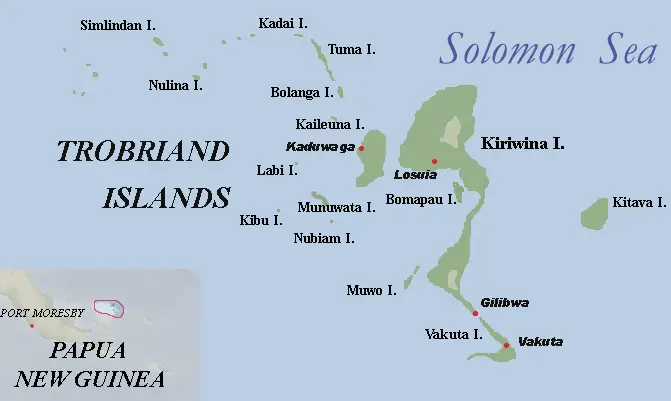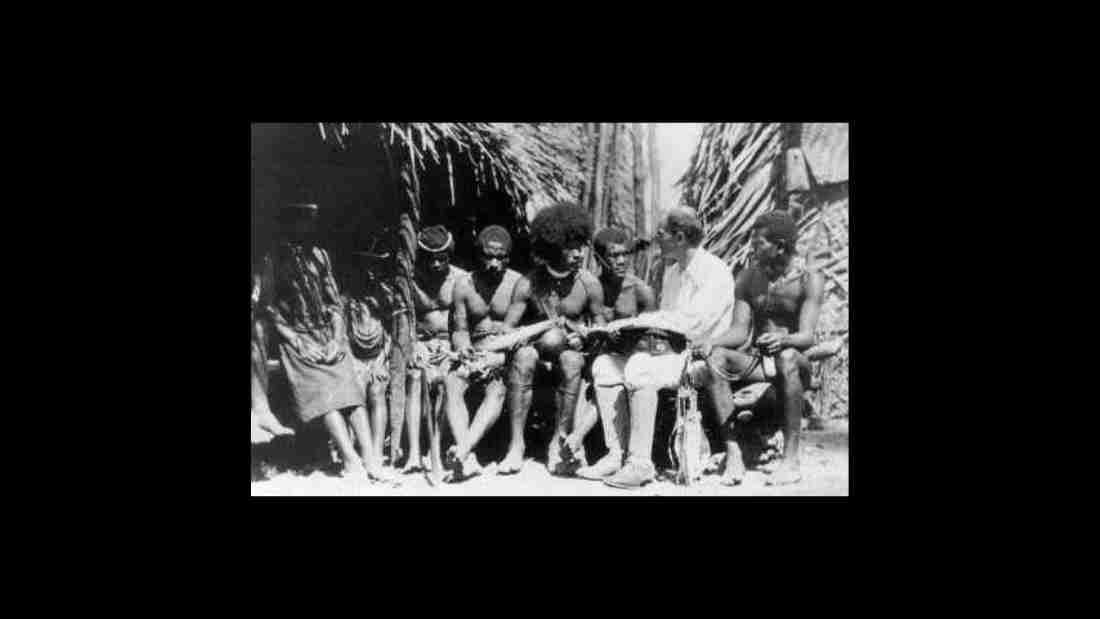In the early twentieth century the Trobriand people were the subject of an in-depth ethnographic study by Bronislaw Malinowski. The anthropologist lived on Mailu Island for several years. He learnt their language and interacted with the islanders daily. His stated aim was to understand the “imponderabilia of everyday life” in the tribe.
The Trobriands are an archipelago of islands on the south-eastern side of Papua New Guinea. The Trobriand islanders participate actively in a “human social institution” (Malinowski, 1922) called the kula, a complex system of exchange based on magical beliefs, traditions, duties and obligations.
The Trobriand people are one of the tribes that participate actively in a “human social institution” called the kula, a complex system of exchange based on magical beliefs, traditions, duties and obligations.
What other systems of exchange did Malinowski observe in the Trobriand Islands?
In order to understand the psychology behind the different types of exchange that permeate Trobriander society, one needs to consider the fact that the tribesmen are born with a specific rank and social status which is inherited, cannot be changed and is not related to material possessions.
This social hierarchy, as well as a strict code of rules of kinship, is reflected in the systems of exchange. People of higher rank or wealth are expected to share their possessions, thus showing their generosity but also their superiority.
Vassal villagers, on the other hand, give pokala (harvest gifts) as an act of subordination to their chief. The chief then reciprocates by giving them symbolic gifts in return.
The brothers of a married woman give urigubu (harvest gifts) to her husband. The husband occasionally returns the favour by giving them youlo (counter gifts of lower value).
A means of providing social welfare or credit
These systems of exchange act as a social welfare system or credit arrangement. They also cement bonds between families and clans (Thomas and Warrall, 2002, as cited in Lee, 2011).
The pokala and urigupu offerings enable the recipients to accumulate wealth in the form of food which is ostentatiously displayed in storehouses. The understanding is that if the givers require assistance due to some misfortune, the recipients are under obligation to share their supplies with them (Lee, 2011).
These systems of exchange act as a social welfare system or credit arrangement, while cementing bonds between families and clans
The tribes do not have a monetary system. Instead they have defined gift exchanges for the settling of social obligations. These are called the mapula (repayment), and operated in the same way as set prices in the West. The mapula regulate the gifts that are owed for magical or other specialised services. Examples include sagali (death-related services) for mourners and grave diggers, and love gifts given immediately after having sex.
Achieving social prestige and status in the tribe
Trobrianders who have social ambitions must operate within the narrow confines allowed by custom. Social distinction can be obtained by being an excellent worker. This would be evidenced by having a manicured and decorated garden and winning the title of tokwaybagula (efficient gardener). Alternatively the tribesman could display intricate taitu showing off beautiful produce (Malinowski, 1922).
However, more importantly, it is social relationships and connections that are key indicators of status. Tribesmen nurture and optimise their network through gift exchanges that create “relation capital” (Lee 2011). The principle of reciprocity is key to the process. When a gift is given, a social obligation is created between the person giving the gift and the one receiving it. The social ties resulting from intra-tribe exchange form the basis for the prestige of the tribesman, which can then be bolstered by excelling in inter-tribe kula exchanges (Weiner 1976, 1988, as cited in Lee, 2011).
Social relationships and connections are key indicators of status, and tribesmen nurture and optimise their network through gift exchanges that create “relation capital”
The Kula – a ceremonial exchange of considerable importance in the region

The kula is a ceremonial exchange of highly valued artifacts between the tribes living on the ring of Trobriand islands. It is based on a flow of soulava (long necklaces made out of discs of red shell) moving clockwise around the circuit and mwali (arm bracelets made of white shell) moving in the opposite direction.
The exchange is regulated by detailed rules. These include the organisation of magical ceremonies and the establishment of lifelong partnerships between men from different tribes (Malinowski, 1922). The participants are introduced and vouched for by close relatives. Furthermore, the kula partnerships are inherited from one generation to the next (Ziegler, 2008).
A source of special personal magical power
Success in the kula is a matter of great pride and ascribed to special personal magical power. The constant flow of ceremonial gifts is entrenched in each tribe’s culture and steeped in much lore and magic. It is in fact discussed and dissected at length throughout the year. Ultimately the kula enables tribesmen who participate to build “fame” (Lee 2011).
As their reputation grows the tribesmen start attracting a stream of valuable gifts which they then show off to the other villagers. The entire tribe basks in the shared glory of the temporary ownership of the article in question. This makes the tribesman the topic of much speculation regarding who he will gift the desired object to next.
Safeguarding peace and social order
Obviously, the abovementioned motivations are micro in nature, in that they relate to the social structure and standing of Trobrianders within their own tribes. However, the more important elements of the kula concern the exchanges that happen between tribes on different islands.
The “main function of the kula is the creation of a social order by establishing a network of peaceful social relationships among stateless tribal societies, therefore fostering economic trade among them”
Ziegler 2008
The more important elements of the kula concern the exchanges that happen between tribes on different islands.
The kula thus came into being for much the same reason that the European Union was created after WW2. Its focus is to form strong bonds between tribes in the region and to guarantee peace. This is very important in a region which includes aggressive tribes such as the Dobu, who terrorised their neighbours with practices such as head-hunting and cannibalism.
Lifelong partnerships
It is fuelled by ambitious tribesmen competing for social status who keep the international exchanges going, often at great risk to themselves. In the process they create lifelong partnerships that bind people from different tribes together (Ziegler, 2008). Once again this is a similar concept to the EU, which champions freedom of movement and free trade, and funds programmes such as ERASMUS to encourage student exchanges to create bonds between the member countries.
“In order to trade, man must first lay down his spear. When that is done he can succeed in exchanging goods and persons not only between clan and clan but between tribe and tribe and nation and nation”
Mauss, 1962, as cited in Ziegler, 2008
Conclusion
It is clear that these exchange systems underpin the entire structure of Trobriander society. They form the basis of payment mechanisms, social welfare and credit, while also uniting the various tribes in the region through bonds of reciprocity and obligation that ensure the ongoing peace of the region and fosters trade.
Bronislaw Malinowski and his ethnography on the Trobriand islanders set a new standard in field research and ethnography. He was a trailblazer in the practice of participant observation and his influence on anthropology can be strongly felt to this day, more than a hundred years after he first pitched his tent on Mailu Island.
For Further Reading
What are the key components of the anthropological perspective?
“Cultural values are a web of linked concepts, fixed in time and space.”
Evans-Pritchard and the Religion of the Nuer Tribe
How do economic and residence practices impact women’s status and power?
What are the different marriage wealth-exchange practices?
Claude Lévi-Strauss’s Structuralism and its Influence on Anthropological Thought
Clifford Geertz and the Thick Description of the Balinese Cockfight
Bronislaw Malinowski, the Trobriand people and the Kula
Dance as Ritual – an anthropological perspective
How Residence Customs After Marriage Vary Around the World
Compare the operations and implications of Bridewealth and Dowry
The impact of Assisted Reproductive Technologies (ARTs) on Anthropology
“The two-gender system is neither innate nor universal” (Towle and Morgan 2006)
The 4 Main Branches of Anthropology – Unlocking the Secrets of Human Diversity
Anthropology vs Sociology – Which Lens to Use When Studying Humanity?
Disclosure: Please note that some of the links in this post are affiliate links. When you use one of my affiliate links, the company compensates me. At no additional cost to you, I’ll earn a commission, which helps me run this blog and keep my in-depth content free of charge for all my readers.


